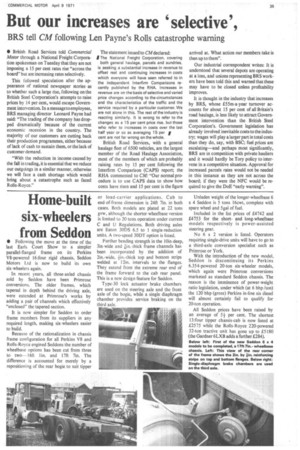But our increases are 'selective',
Page 37

If you've noticed an error in this article please click here to report it so we can fix it.
BRS tell CM following Len Payne's Rolls catastrophe warning • British Road Services told Commercial Motor through a National Freight Corporation spokesman on Tuesday that they are not imposing a 15 per cent rates rise "across the board" but are increasing rates selectively.
This followed speculation after the appearance of national newspaper stories as to whether such a large rise, following on the British Steel Corporation's attempts to raise prices by 14 per cent, would escape Government intervention. In a message to employees, BRS managing director Leonard Payne had said: "The trading of the company has dropped dramatically because of the current economic recession in the country. The majority of our customers are cutting back their production programmes, either because of lack of cash to sustain them, or the lack of customer demand.
"With the reduction in income caused by the fall in trading, it is essential that we reduce our outgoings in a similar manner, otherwise we will face a cash shortage which would bring about a catastrophe such as faced Rolls-Royce." The statement issued to CM declared: I The National Freight Corporation, covering both general haulage, parcels and sundries, is seeking a substantial increase in revenue to offset real and continuing increases in costs which everyone will have seen referred to in the independent Interfirm Comparisons recently published by the RNA. Increases in revenue are on the basis of selective and varied price changes according to the circumstances and the characteristics of the traffic and the service required by a particular customer. We are not alone in this. The rest of the industry is reacting similarly. It is wrong to refer to the changes as a 15 per cent price rise, but those who refer to increases in costs over the last half year or so as averaging 15 per I
cent are not far wrong on the whole.
British Road Services, with a general haulage fleet of 6500 vehicles, are the largest member of the Road Haulage Association, most of the members of which are probably raising rates by 15 per cent following the Interfirm Comparison (CAPS) report; the RHA commented to CM: "Our normal procedure is to use CAPS data to show how costs have risen and 15 per cent is the figure
arrived at. What action our members take is then up to them".
Our industrial correspondent writes: It is understood that several depots are operating at a loss, and unions representing BRS workers have been told this and warned that these may have to be closed unless profitability improves.
It is thought in the industry that increases by BRS, whose £55m-a-year turnover accounts for about 15 per cent of all Britain's road haulage, is less likely to attract Government intervention than the British Steel Corporation's. Government legislation has already involved inevitable costs to the industry; wages will play a larger part in total costs than they do, say, with BSC; fuel prices are escalating—and perhaps most significantly, BRS are in competition with private hauliers and it would hardly be Tory policy to intervene in a competitive situation. Approval for increased parcels rates would not be needed in this instance as they are not across the board; if they were the NFC would be required to give the DoE "early warning".




































































































































